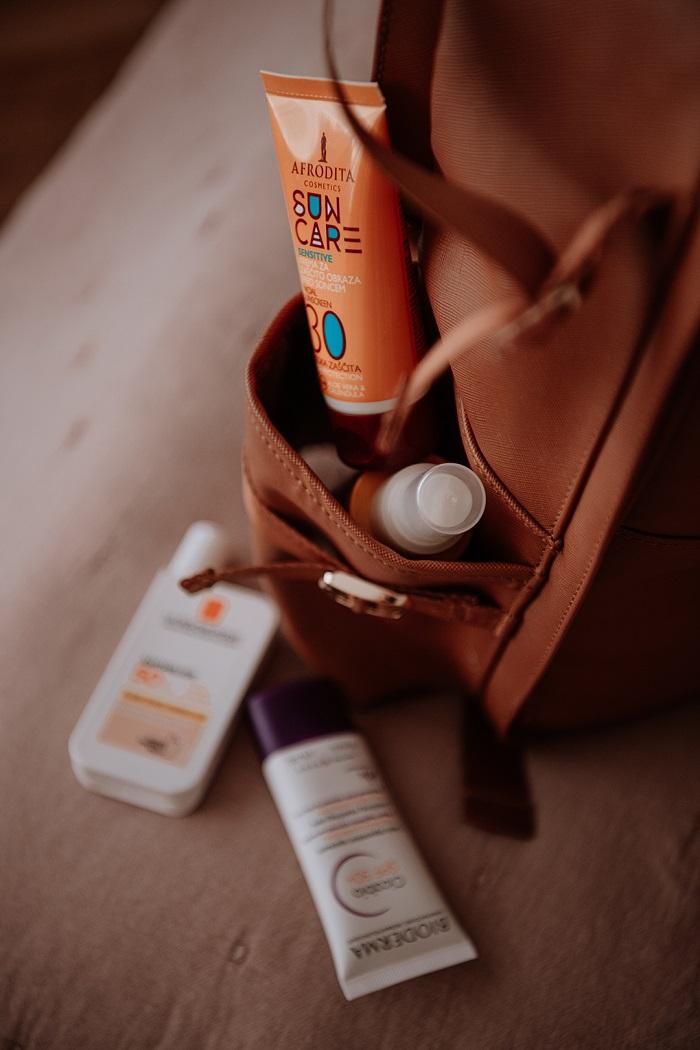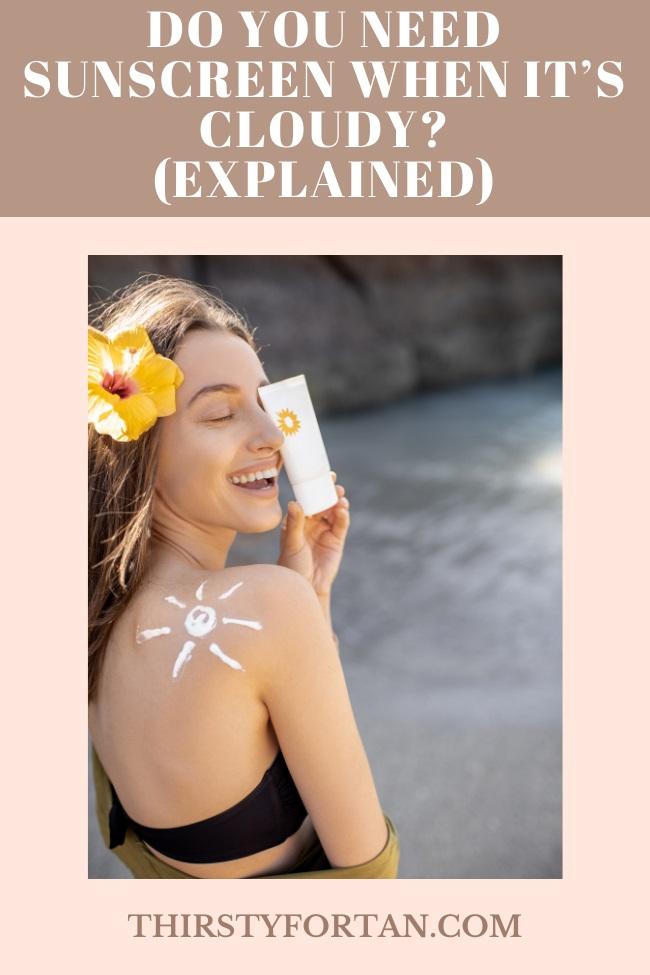We all know it’s important to wear your sunscreen during the summer months, particularly when on holiday in a hot place, or when spending the day outside, but what about when it’s cloudier – do you still need sunscreen on a cloudy day? Here are all the answers.
How does sunscreen work?
Before you find out about the importance of sunscreen and, more importantly, whether you need to wear it on a cloudy day, it’s really useful to be aware of how it works and understand the entire process that takes place in your skin. Going back to the basics is a good refresher if you already know a lot about this topic and, if you don’t it’ll be a good thing to know, as it’s always good to understand exactly how something works before you actually use it.
To begin with, as you may already know, the Sun emits lots of different waves and rays, some of which reach us here, in the Earth’s atmosphere, and others are deflected back before they even get here (the atmosphere is really effective at protecting us from these dangers!). One of the types of waves that does reach us, however, is something known as ultraviolet light, and it splits further into two different types, UVA and UVB. These two different rays can do lots of damage to our skin, and wearing a sunscreen will protect you from them, as you’ll discover, and you can find out about some of the damage they cause later.
There are also two different types of sunscreens, although this doesn’t have anything to do with the fact that there are two different types of rays, and these two types are known as chemical and mineral (or physical).
A chemical sunscreen protects your skin by being absorbed into your skin, and dispersing itself throughout the various top few layers, and across, to create a strong defence against UVA and UVB. When the Sun’s rays begin to penetrate your skin, the chemicals and active ingredients in the chemical sunscreen essentially absorb them and this protects your skin, as it takes place before the rays are deep enough to cause any damage.
On the other hand, mineral sunscreens work in a very different way, and they sit on top of the skin’s surface when they’re applied, and can be spread to create a ‘barrier’ in front of your skin to protect it from any potential damage which may come from the Sun. When the UV rays get to you, they are reflected back to where they came from before they can do any damage, somewhat like a mirror.
Some of the effects that can come from repeated unprotected sun exposure can be quite severe and alarming, and they should definitely be a large enough incentive to encourage you to wear a sunscreen every day. If you’re wondering what these effects are, they include:
- A higher risk of developing melanoma, the deadliest type of skin cancer
- Sunburn, as we all know
- Premature aging and enhanced aging for those who are older, or already see signs of aging developing
- Skin irritation separate to sunburn
- Your other skincare products and treatments are less likely to be effective
- Hyperpigmentation and darker areas or uneven skin tone
- SUPERIOR ENDURANCE VS. SWEAT & WATER — From family fun to hardcore competition, Banana Boat Sport Sunscreen provides strong sun protection that stays on so you can play on
- CLINICALLY PROVEN UVA/UVB PROTECTION — This SPF 50+ broad spectrum sunscreen spray protects skin from the sun's harmful UV rays
- 3-fluid ounce travel size bottle of Neutrogena Ultra Sheer Dry-Touch Non-Greasy Sunscreen with SPF 70 for broad spectrum UVA/UVB protection
- This lightweight and sheer sunscreen is fast-absorbing with Dry-Touch technology for a non-greasy, matte finish that leaves skin feeling clean. The face and body sunscreen is formulated with Helioplex for superior sunburn protection for your skin
- EltaMD UV Clear Face Sunscreen is a lightweight oil free sunscreen made with transparent Zinc Oxide that leaves no white cast after applying and helps block damaging UVA and UVB rays from the sun
- Dermatologist recommended face sunscreen for acne prone skin is oil-free, protects against breakouts, and is an essential acne sunscreen for those with acne prone skin care concerns and other sensitive skin types like rosacea and hyperpigmentation
If you click Buy on Amazon and make a purchase, I'll earn a small commission at no additional cost to you.
Also read:
7 Things A Sunscreen Does to Your Skin (Explained)
What SPF Sunscreen Should You Wear to Exercise Outside? (Explained)
Do You Need Sunscreen in the Shade? (Explained)
Do you need sunscreen when it’s cloudy?
Obviously, it’s easy to see exactly why you need to wear sunscreen on days when it’s sunny, which is what makes sunscreens so popular in the summertime and gives retailers a huge opportunity to promote their products, just in time for everyone’s summer breaks and vacations. However, you may have heard mention about wearing sunscreen every day and it’s easy to see why this can cause some confusion. So, it’s time to solve this problem of a lack of information!
In short and simple terms, yes, you do need to wear sunscreen every day, even when it’s cloudy, and there is a strong science-backed explanation behind this in case you’re not completely convinced. In fact, it’s even more important to specifically remember to apply your sunscreen when the day is cloudy, as you are more likely to be deceived by the weather and end up coming home with even more damage than you wouldn’t think to wear sunscreen.
The reason why you need to wear sunscreen even when it’s cloudy is actually pretty simple once you think about it and understand it, but it’s something you probably would specifically come up with to begin. Earlier, we saw exactly how sunscreens work, but we didn’t go into too much depth concerning why the sun causes the damage it does, and how its UV rays do this.
When the Sun emits its ultraviolet light, the rays are coming from all directions, and go in many different directions but, because they’re everywhere, it’s inevitable that some rays will reach your skin eventually. When this happens, they penetrate the layers of your skin, and this is where they start to cause damage if you’re not wearing a sunscreen.
So, you may still be wondering why this means you need to wear sunscreen on a cloudy day and that’s okay – we’re just getting onto that now. In essence, the common misconception which leads people into thinking that they only need to wear a sunscreen in the summer mainly stems from the fact that the Sun’s light and heat both tend to be stronger during this season. However, the key piece of information which many people don’t know is that the temperature and light intensity doesn’t actually have a completely direct correlation to the levels of dangerous UV being emitted.
In fact, even when it’s cloudy, you can still see some natural light from the Sun, and although you may not notice it as much, you are still under its light which is an obvious indication of the fact that the Sun is, in fact, still out, even though it just seems ‘normal’ – not particularly warm and maybe even colder.
The clouds, if you didn’t already know, are just a condensed form of water that comes from steam when the water is evaporated, and they are formed when something known as water vapor collects together. This means that your clouds are actually just water, and that doesn’t do much in terms of protecting you against UV rays.
In other words, even though the clouds may dim the Sun’s light a little, they don’t manage to block out the UV rays, so they still have the opportunity to damage your skin, and this is a problem if you’re not protecting yourself using an effective sunscreen.
Also read: Do You Need Sunscreen in Winter? (Explained)
Final thoughts
Hopefully, you are now aware of the importance of wearing a sunscreen, even on cloudy days. In the end, the main thing you need to remember is that, although you may not think that there’s a danger of sunburn, or even any sun-related skin damage whatsoever, on a cloudy day, there actually is. This makes it even more important to remember your sunscreen every day, and even go out of your way to check that you have applied it every morning before you go out.
And remember, if you’re ever in doubt, wear a sunscreen, or speak to a dermatologist or professional for their personal, tailored advice.







